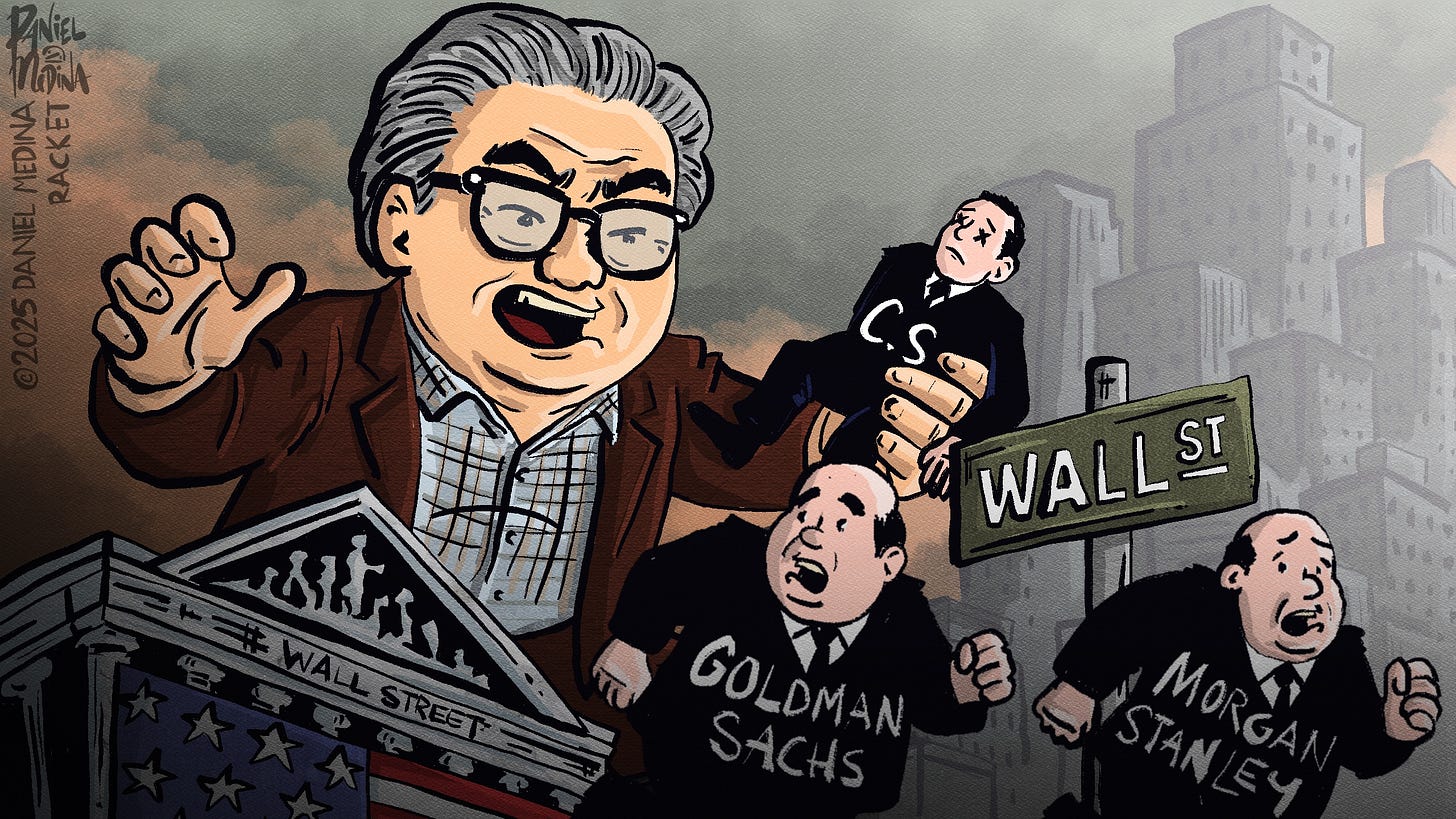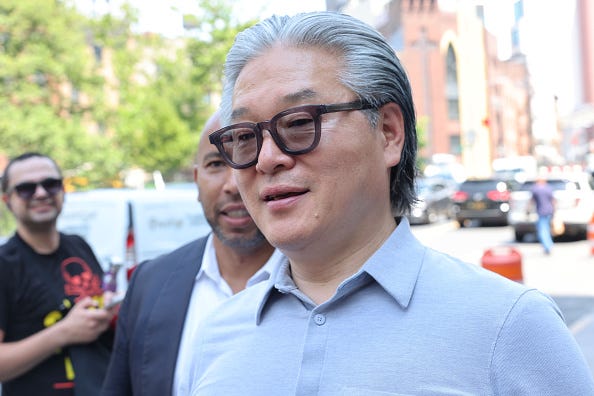Final Chapter Closes on Archegos Scandal
Goldman, Morgan Stanley and Wells Fargo Settle Archegos-Fueled ViacomCBS Lawsuit For $120 million
It was reported this past Monday that Morgan Stanley, Goldman Sachs and Wells Fargo will pay a combined $120 million to settle a lawsuit that claimed they hid conflicts of interest while they sold millions of shares of ViacomCBS due to their involvement in Bill Hwang's $36 billion Archegos Capital Management fiasco in 2021.
This settlement marks a rather boring end to one of the greatest and darkly comical incidents to take place on Wall Street, one that inflicted more than $10 billion total in losses for the banks Credit Suisse, Nomura, UBS and Mitsubishi UFG. Morgan Stanley, Wells Fargo, Goldman Sachs, and Deutsche Bank were also caught up in the scandal.
The Archegos saga exploded on Friday, March 26, 2021. The stock prices of nine major U.S. and Chinese stocks plummeted on tremendous volume. For example, one stock, Viacom, dropped over 27% on an insane volume of more than 216 million shares, more than 10 times the stock’s average daily volume! In one day, $35 billion of market value in these nine stocks evaporated. Michel Keusch, portfolio manager at Bellevue Asset Management AG in Switzerland, told Bloomberg News he had “never seen something of this magnitude in my 25-year career.”
The next day, as many were scratching their heads trying to figure out what the hell happened, Bloomberg News reported:
Goldman Sachs sold $6.6 billion worth of shares of Baidu Inc., Tencent Music Entertainment Group and Vipshop Holdings Ltd. before the market opened in the U.S., according to an email to clients seen by Bloomberg News. That move was followed by the sale of $3.9 billion of shares in Viacom CBS Inc., Discovery Inc., Farfetch Ltd., iQiyi Inc. and GSX Techedu Inc.
Morgan Stanley, Credit Suisse and Nomura Securities were also identified as large block sellers as the weekend wore on. Nomura stated that it may incur up to $2 billion in losses due to one client. Credit Suisse also reported that they expected significant losses due to the same client.
By Sunday, the client was identified as Bill Hwang and his family office, an industry term for super wealthy families that only manage their own money. Archegos Capital Management. How the hell could one guy do all that to eight of the biggest securities firms on the planet, at the same time?
With his family office exploding, Hwang managed to complete a career hat trick of:
Destroying investor wealth (Including his own)
Getting busted for insider trading
Blowing massive holes in Wall Street banks’ balance sheets, including Credit Suisse for whom this fiasco was perhaps the last nail in its coffin. The storied Swiss bank hobbled its way toward oblivion two years later.
Who the heck is Bill Hwang?
The Wall Street Journal had a pretty funny description of Hwang
“Behind the enormous losses was Mr. Hwang, a 57-year-old Korean-born investor, devout Christian and protégé of famous hedge fund veteran Julian Robertson. Mr. Hwang built his fortune swinging for the fences, often focusing his investments in just a few stocks, paying little attention to hedging his positions while borrowing large amounts of money to boost his returns.”
That doesn’t exactly sound like the guy you want to literally bet the bank on!
In 2008, when Hwang was managing other people’s money at his hedge fund, he was supposed to be trading Asian equities, his expertise. Instead, his investors were quite upset to find that Hwang had gotten them into what was the “GameStop” short squeeze of the 2000s —,Volkswagen — which ended in disaster. VW skyrocketed over 350% in value in two days as Porsche announced it was amassing a 75% stake in the company, crushing short sellers.
Then in 2012, Hwang and his hedge fund, Tiger Asia Management, reached a $44 million settlement with the SEC on claims of insider trading. After this, Hwang started Archegos to manage his own fortune.
Archego Goes All In
Archegos, according to the SEC complaint, had exposure to more than 50% of VicacomCBS, 60% of Discovery Class A stock, and even 70% of a Chinese online education company. But these and other companies had no idea because his exposure to the stocks were through derivative transactions known as Total Return Swaps (TRS).
TRS have been around for a long time. The transaction essentially replicates for the client (usually hedge funds) the profile of being long or short a specific asset or basket of assets. The derivative dealer — usually Wall Street banks — puts the asset in question on their balance sheet and structure the transaction as follows.
1. The dealer acquires the asset, in this case a stock like Viacom, and puts it on its balance sheet.
2. The hedge fund, in this case Archegos, posts liquid collateral as initial margin with the dealer.
3. The dealer pays Archegos if the price of Viacom increases.
4. Archegos pays the dealer if the price of Viacom goes down.
5. Archegos pays the dealer a funding charge since the Viacom stock resides on the dealer’s balance sheet used to hedge the dealer on the TRS
6. Based on the value of Viacom, Archegos may have to post additional margin if Viacom’s value drops.
Say there’s a TRS on 20 million shares of Viacom, and Archegos posted the value of 10 million shares as margin. It would still have exposure to $20 million. It would be the same as if Archegos purchased 10 million shares of Viacom and borrowed from the dealer to purchase the remaining 10 million shares. That is the leverage TRS provide.
Why did Archegos use derivatives?
Archegos used TRS for leverage and, perhaps more importantly, to stay under the radar. The TRS allowed Archegos to have huge stakes in companies without filing required filings with the SEC. Instead, the banks he was doing the swaps with show up as the owners of the stock. For instance, for the first quarter of 2021, Credit Suisse and Nomura were the fifth and sixth largest holders of Viacom stock. Nearly all of that was on these banks’ balance sheets. If you combined the Viacom holdings of Credit Suisse, Nomura, Morgan Stanley, UBS and Goldman Sachs during the first quarter of 2021, they would be the largest common stock holder of a multi-billion dollar corporation.
Perhaps something could have been done to stop the insanity if the companies and investors had known that a guy with a history of rule-breaking and careless risk-taking used massive leverage to buy more than half a company’s stock
It appears that Archegos and the dealers began amassing his stake in the companies in early 2021. Meanwhile, Viacom’s share price nearly doubled from February 1 to March 22. Viacom was so pleased that it announced plans to issue $3 billion in new stock. Viacom shares dropped sharply on the news and then plummeted as the Archegos’ highly leveraged positions generated margin calls that he could not meet and hence, the unprecedented selling of what were now the dealer’s positions on Friday, March 26th. Essentially, it only took one big loser to wipe out the entire book of TRS, which is exactly what happened.
Now comes the dark comedy of this tale. The dealers who fueled Archegos’ insane risk taking seemingly did not know that they were all in the same trades together with Archegos! According to the SEC complaint, Archegos routinely lied to the various bank counterparties as to what their Net Asset Value’s (“NAV”) real exposure was to one of the nine stocks they had massive exposure to. The complaint cites a question that an employee of CP4 — another bank that Archego had a TRS with — raised with Archegos’ trader about shares in a company called GSX.. The trader, Tomita, would only say that Archego was not a “disclosed holder” of GSX.
The CP4 employee expressed concern that if Archegos held similarly-sized positions in GSX across its Counterparties as it did with CP4, then Archegos might cumulatively be the beneficial owner of almost 20% of GSX’s outstanding shares.
In response, Tomita misled the individual into believing that it must have been other entities’ SBS positions that caused those reported positions, not Archegos, when in fact (as Tomita knew) it was Archegos, which at the time had exposure to about 59% of GSX’s outstanding shares through SBSs.
Archegos lied and the Wall Street banks, despite their correct concern that there was a problem, believed them. They then provided Archegos even more exposure, which the complaint explains happened time and time again nearly to the end.
The week leading up to the March 26, 2021, blowup, the SEC apparently got wind that that something funky was going on and called on the dealers involved. This is when Goldman, Morgan Stanley, Credit Suisse, Nomura, UBS, Deutsche Bank and the rest realized, seemingly for the first time, that Archegos had done the same trades with all of them!
Boom!
The banks got together on a call before the fateful Friday in an attempt to manage the dumpster fire. Credit Suisse and Nomura suggested that the banks work together to slowly and quietly unwind the mess. It seems that while nodding their heads, Goldman, Morgan Stanley and Deutsche Bank ran to the exits and pulled the rip cord, selling millions of shares of the nine companies. Credit Suisse, Nomura and UBS were left holding the bag and took the majority of the losses associated with the Archegos unwind.
Interestingly, Credit Suisse commissioned a report for its board of directors to try and explain how it managed to lose $5.5 billion.
The Archegos default exposed several significant deficiencies in CS’s risk culture, revealing a Prime Services business with a lackadaisical attitude towards risk and risk discipline; a lack of accountability for risk failures; risk systems that identified acute risks, which were systematically ignored by business and risk personnel; and a cultural unwillingness to engage in challenging discussions or to escalate matters posing grave economic and reputational risk. The Archegos matter directly calls into question the competence of the business and risk personnel who had all the information necessary to appreciate the magnitude and urgency of the Archegos risks, but failed at multiple junctures to take decisive and urgent action to address them.
In 2024, Credit Suisse had to do the Geneva Walk of Shame and let themselves be absorbed by their hated rival UBS, while Bill Hwang was sentenced to 18 years in prison. Archegos Chief Financial Officer Patrick Halligan was sentenced to eight years.
The Archegos saga yet again confirms that when it comes to making lots of money, people in positions of authority do incredibly stupid and greedy things. Once again, the “smartest guys in the room” really weren’t that smart at all.



I have dreams that somebody calls the options on a Pelosi trade and crushes them. It’s almost impossible for it to happen but it would be sweet justice.
"It seems that while nodding their heads, Goldman, Morgan Stanley and Deutsche Bank ran to the exits and pulled the rip cord, selling millions of shares of the nine companies. "
I don't know why, but the context of this line made me laugh out loud. If 'they' were to make a movie of this episode, this scene could be a comic gold mine. Would love to hear the rip-cord-pullers POV on that action.